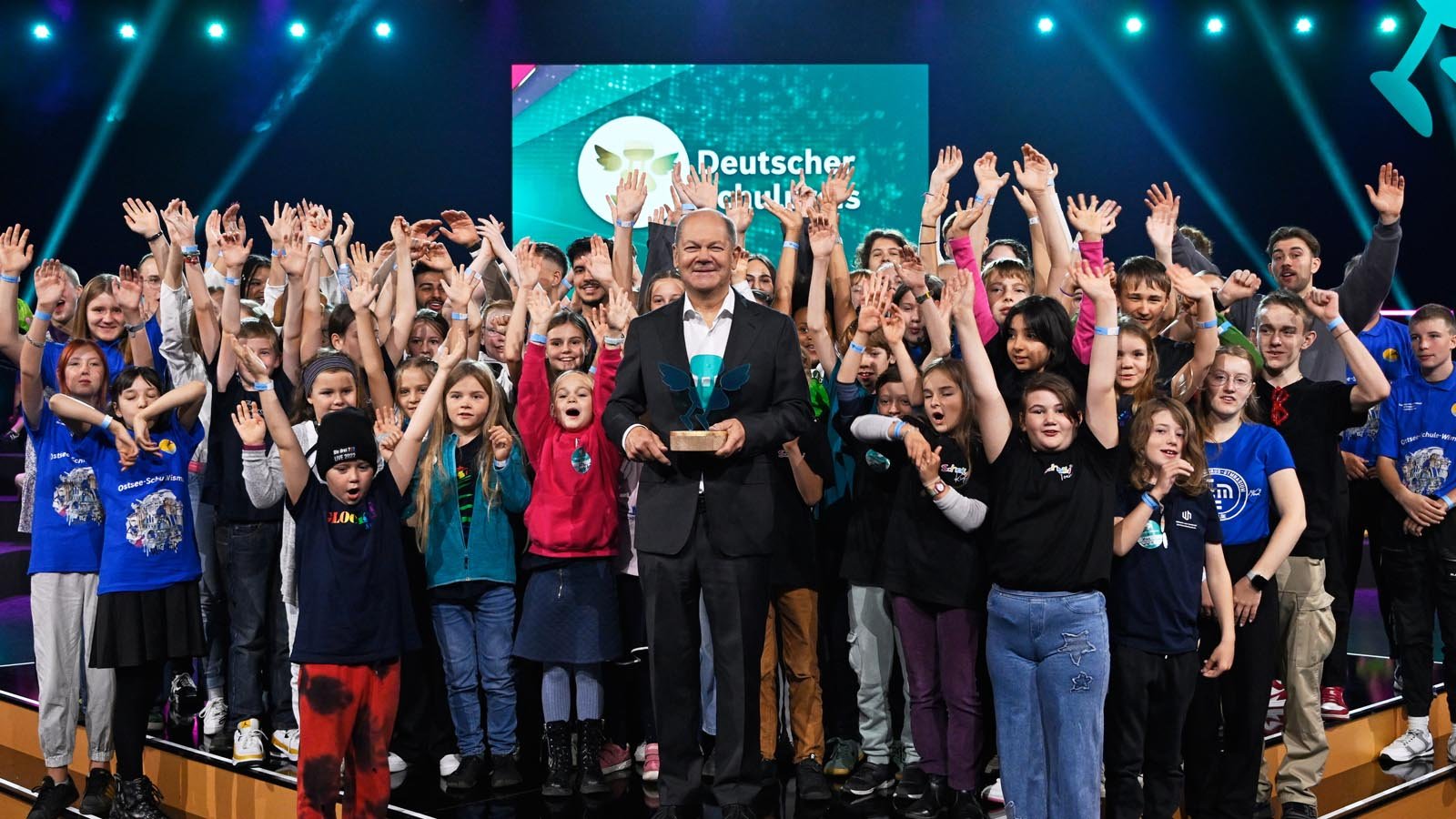These are the winning schools for 2024
The German School Award has been presented in Berlin to the schools of the year. The main prize was won by a special school in Bonn. Federal Chancellor Olaf Scholz paid tribute to the prizewinners.
The main prize of the German School Award 2024 goes to North Rhine-Westphalia: the Siebengebirgsschule in Bonn, a special school focusing on learning, language and social-emotional development, wins the award, which is endowed with 100,000 euros. Five further awards of 30,000 euros went to the Friedenauer Gemeinschaftsschule in Berlin, the Wilhelm-von-Humboldt-Gemeinschaftsschule in Berlin, the Joseph-DuMont-Berufskolleg in Cologne, the St.-Pius-Gymnasium in Coesfeld, and the Thomas-Morus-Gymnasium in Oelde (the latter three schools also lie in North Rhine-Westphalia).
Nine further finalists received recognition awards of 5,000 euros each. Every year, the Robert Bosch Stiftung and the Heidehof Stiftung award prizes to the best of the schools that participate in the competition. Germany's public television channel ARD and ZEIT publishing group also participate as partners.
"Great ideas and plenty of commitment"
Chancellor Olaf Scholz honored the award winners today in Berlin’s Tempodrom arena: “Our school years shape us for life. Good schools impart knowledge and self-confidence, promote creativity and a sense of community. All of the schools that have applied for the German School Award demonstrate how this can be achieved every day with great ideas and a great deal of commitment. At the same time, educational success in our country still too often depends on the starting conditions of the students at the beginning of their education. This year, the federal and state governments launched the "Startchancen-Programm” (Starting Opportunities Program), the largest and longest-running education program in the history of the Federal Republic of Germany. Our goal is for all students to be able to fully develop their talents.”
Individual learning settings and independent work
The 265 students at the Siebengebirgsschule in Bonn, Germany, learn independently, without a traditional timetable or fixed classrooms. It is a special school for children with learning, emotional, social and linguistic disabilities. Here, students develop their potential and find their way to social participation.
“The Siebengebirgsschule addresses children who are overwhelmed in regular schools and enables them to get back into learning, discover their talents, and achieve outstanding results,” says Prof. Dr. Thorsten Bohl, spokesman for the jury of the German School Award and Director of the Tübingen School of Education. The basis for this is a well-designed school culture with flexible and core working hours, which gives students a high degree of personal responsibility and results in more productive learning time.
"The Siebengebirgsschule also offers other schools guidance in adapting its methods, such as its tailored diagnostics and support, its individual learning model, and the smart use of digital tools."
At the start of the school day, pupils log into the digital LearningNavi on their own with their iPad. Instead of fixed timetables, the lesson content is mapped out through learning paths, missions, and individually adapted work schedules. This school is an example of what is possible when we genuinely trust students, focus on their strengths, and create incentives rather than rely on punishments.
learn more
Detailed background information about the Siebengebirgsschule Bonn, the five other prize winners, and all nominated schools can be found in the publication on the German School Award 2024. In the brochure, jury members explain what characterizes teaching at the prize-winning schools
You can watch video portraits about the 15 nominated schools on the German School Award website.
Identifying and disseminating promising concepts
“Innovative ideas are rarely imposed from above. They emerge in the field, on the ground in schools,” says Dr. Bernhard Straub, Chief Executive Officer of the Robert Bosch Stiftung. “With the German School Award, we want to identify these promising concepts and contribute to their dissemination. But the competition is by no means all there is to it. Recently, we have created numerous support programs for schools that want to improve their own school and teaching development. This year's top prize-winner is an excellent example. During the coronavirus pandemic, it first participated in the competition with its extraordinary digital learning concept. As a result, it entered the two-year development program of the German School Award."
All finalists participate in a rigorous application process over the past few months. In March, the jury selected 20 schools from over 80 applications. Between April and June, a jury team evaluated them. It then nominated 15 schools for the final round.
All general education and vocational schools in Germany as well as all German schools abroad can apply for the German School Prize 2025. Deadline: January 31, 2025. More information at

